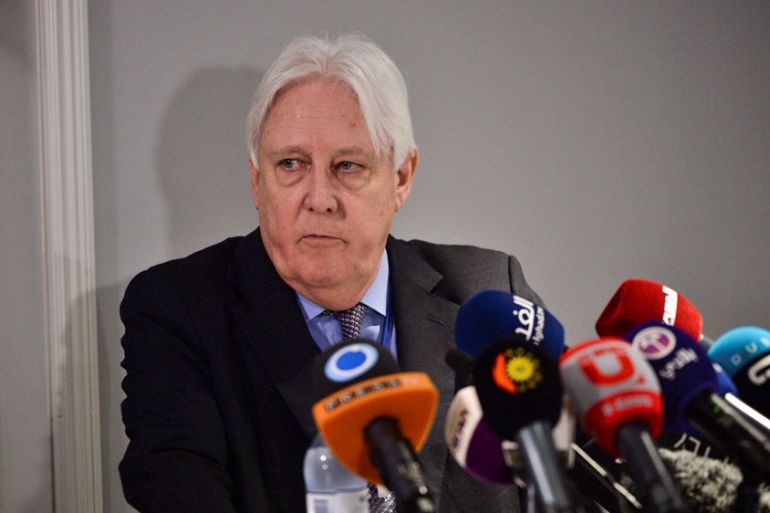UN raises alarm on ‘dramatic deterioration’ in Yemen conflict
UN Special Envoy for Yemen Martin Griffiths tells UN Security Council fighting must end to stop Yemen’s humanitarian crisis.

The United Nations special envoy for Yemen, Martin Griffiths, has warned of a “dramatic” deterioration in the country’s long-running conflict, raising the alarm over the expansion of fighting on several fronts amid a worsening humanitarian crisis.
Speaking at a monthly briefing of the UN Security Council, Griffiths said on Tuesday an ongoing offensive by the Houthi rebels on Marib province – the last northern stronghold of Yemen’s Saudi-backed, internationally recognised government – was putting civilians, including an estimated one million internally displaced people, at risk.
Keep reading
list of 3 itemsProtesters storm presidential palace in Yemen’s Aden
Blinken to UN’s Yemen envoy: No military solution to the conflict
“Fighting forces on both sides have suffered heavy losses in this unnecessary battle,” he said, condemning “shocking” reports of “children increasingly getting drawn into the war effort and deprived of their future”.
Griffiths also raised alarm about the increase in cross-border attacks in recent weeks, highlighting concerns that missile and drone attacks targeted civilian and commercial infrastructure in neighbouring Saudi Arabia and around Yemen’s Houthi-held capital, Sanaa.
Yemen’s war broke out in late 2014 when the Houthis seized large swaths of the country, including Sanaa. The conflict escalated significantly in March 2015 when Saudi Arabia and the United Arab Emirates assembled a United States-backed military coalition in an attempt to restore the government of President Abd-Rabbu Mansour Hadi.
The latest escalation comes amid renewed diplomatic efforts by the UN and the US to reach a ceasefire that would pave the way for a resumption of UN-sponsored political talks to end the protracted conflict that has killed tens of thousands of people, destroyed much of Yemen’s infrastructure and pushed millions of people to the brink of starvation.
“Famine has now arrived to add to the tragedy of Yemen,” Griffiths said. “It is logical therefore and it has been incumbent for the parties now more than ever to stop the fighting and silence the guns.”
Other fronts
Besides Marib, Griffiths said fighting had opened on other fronts in Yemen, including Hajjah, Taiz and the port of city Hodeidah, where the situation was especially bleak.
“There has been a troubling continuation of violence causing civilian deaths and injuries, including women and children,” he said, adding that the prevention of fuel imports was further complicating the crisis.
“Even as the conflict intensifies, acute fuel shortages for civilians persist in Sanaa and surrounding areas. Fuel imports have not been permitted to enter Hodeidah since January. This has contributed to increase in cost of basic commodities,” said Griffiths.
“It is vital that obstacles to the import of fuel and distribution for civilian use are removed,” added the envoy, calling on all parties to priorities civilian needs and not weaponise the economy.
Reporting from the UN headquarters in New York, Al Jazeera’s diplomatic editor James Bays said diplomats were concerned the deterioration infighting made the situation in Yemen, already described as the world’s worst humanitarian crisis, even worse.
“The UN has been warning for months of an imminent famine in Yemen,” said Bays. “With the fighting only escalating, there is not the money to feed the people. The UN at the beginning of the month put out at appeal to get $3.85bn from the international community as a matter of urgency, otherwise, people were going to stave. They only managed to less than half of that, $1.7bn.”
Independent probe into Sanaa fire
In his address, Griffiths also called for an independent probe of a March 7 fire in Sanaa that killed dozens of migrants and wounded more than 170 in a holding facility.
Griffiths said: “The world was reminded of the plight of the migrant community last week when an extraordinary, horrific fire broke out at a detention facility in Sanaa holding predominantly Ethiopian migrants.
“There must be an independent investigation into the cause of the fire.”
Earlier on Tuesday, Human Rights Watch blamed the fire on “unidentified projectiles” fired by the Houthis.